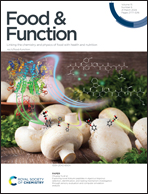Lead exposure exacerbates liver injury in high-fat diet-fed mice by disrupting the gut microbiota and related metabolites†
Abstract
Lead (Pb) is a widespread toxic endocrine disruptor that could cause liver damage and gut microbiota dysbiosis. However, the causal relationship and underlying mechanisms between the gut microbiota and Pb-induced liver injury are unclear. In this study, we investigated the metabolic toxicity caused by Pb exposure in normal chow (Chow) and high-fat diet (HFD) mice and confirmed the causal relationship by fecal microbial transplantation (FMT) and antibiotic cocktail experiments. The results showed that Pb exposure exacerbated HFD-induced hepatic lipid deposition, fibrosis, and inflammation, but it had no significant effect on Chow mice. Pb increased serum lipopolysaccharide (LPS) levels and induced intestinal inflammation and barrier damage by activating TLR4/NFκB/MLCK in HFD mice. Furthermore, Pb exposure disrupted the gut microbiota, reduced short-chain fatty acid (SCFA) concentrations and the colonic SCFA receptors, G protein-coupled receptor (GPR) 41/43/109A, in HFD mice. Additionally, Pb significantly inhibited the hepatic GPR109A-mediated adenosine 5′-monophosphate-activated protein kinase (AMPK) pathway, resulting in hepatic lipid accumulation. FMT from Pb-exposed HFD mice exacerbated liver damage, disturbed lipid metabolic pathways, impaired intestinal barriers, and altered the gut microbiota and metabolites in recipient mice. However, mice exposed to HFD + Pb and HFD mice had similar levels of these biomarkers in microbiota depleted by antibiotics. In conclusion, our study provides new insights into gut microbiota dysbiosis as a potential novel mechanism for human health related to liver function impairment caused by Pb exposure.



 Please wait while we load your content...
Please wait while we load your content...